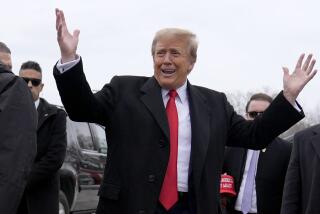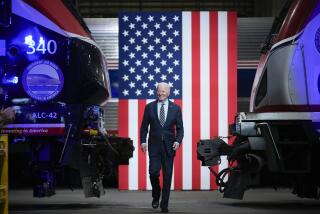Edwards’ Real Worth May Be in Message to Strapped Voters
Where can John Edwards help John F. Kerry?
The most obvious possibility is North Carolina, the state Edwards has represented in the Senate since 1998. Polls showed Kerry, the presumptive Democratic presidential nominee, within range of President Bush in North Carolina even before he selected Edwards as his running mate last week. Democrats think the pick guarantees that Bush will be forced to compete for the state through November.
That it should -- but it will still be a reach for Kerry and Edwards to win the state if the race stays close nationally. No Democrat has carried North Carolina since 1976. In 2000, Bush ran about 8 percentage points better there than he did in the nation overall. So did Republican nominee Bob Dole in 1996. And the Republicans compiled that formidable record against two Southern Baptists -- Bill Clinton and Al Gore -- who fit the state culturally better than Kerry.
Home state pride notwithstanding, these precedents suggest a strong enough Republican tilt in presidential races that Kerry is likely to carry North Carolina only if he’s riding a big wave nationally. And that means Kerry will probably take North Carolina only if he is also winning more than enough states to reach an electoral college majority.
How about the rest of the South?
Edwards might lift Kerry some, but the hill is high. Bush won all 13 Southern states in 2000, and in most recent polls the South remained his strongest region. The Kerry campaign advertised early on in Arkansas and Louisiana, but found the climate inhospitable enough to skip the states in the new ad it bought to tout Edwards’ selection.
The campaign did buy time for the ad in Virginia, where the sprawling suburbs in the northern part of the state increasingly resemble the affluent, socially moderate Northeastern and Midwestern communities that have trended Democratic since Clinton. The state is worth watching, but like North Carolina it still leans Republican in a close race.
For Bush, the one big cloud in Dixie is the Southern state most like the North: Florida.
Several recent polls have shown him slightly trailing Kerry there. Even after the dead heat in 2000, Kerry’s strength is somewhat surprising because the Republicans obliterated the Democrats across the state in the 2002 midterm election; Florida’s economy has also fared better than most over the last four years.
Democrats say Edwards should add energy for Kerry in Florida, but he brings no obvious connection to the state the way Sen. Joe Lieberman (D-Conn.), Gore’s vice presidential pick in 2000, did with his appeal to Jews.
In all, Edwards probably won’t pay his biggest dividends in the South. He may be somewhat more valuable in another area where Bush was strong last time: rural communities and small towns.
As he liked to remind people by blasting the John Mellencamp anthem at his primary campaign rallies, Edwards was born in a small town. In theory, those roots should help Edwards connect with small-town America better than his windsurfing running mate does.
But the proposition remains unproven, especially in the Midwest, where the rural vote could prove most important. During the Democratic primaries, Edwards ran well in rural Missouri. But in Ohio and Wisconsin, he ran no better in the 15 most rural counties than he did in those states overall. And Republicans insist that his liberal record on social issues will create the same problems with culturally conservative voters that Kerry faces.
The obstacles still confronting the Democratic ticket in the South and the countryside mean that Edwards may be much more valuable to Kerry delivering a message than delivering a region. During the primary, what Edwards did best was convey empathy for economically squeezed voters. That isn’t a strong point for any of the other three candidates on the ballot. (It’s easier to picture Vice President Dick Cheney in a bunker than a supermarket.)
Even in a year when the war in Iraq and national security loom so large, the competition for voters uneasy about the economy remains one of the keys. That’s a conclusion from a fascinating survey released late last week by veteran Republican pollster Tony Fabrizio.
Fabrizio surveyed voters in the 19 states that both sides, to varying degrees, considered battlegrounds. He found that Kerry leads Bush by 46% to 44% across this landscape, and that few voters -- about 7% of the electorate -- were undecided.
Most strikingly, Fabrizio found that this critical sliver of undecided voters holds much more pessimistic views about the economy than their neighbors do. Even after months of steady job growth, more than 70% of these undecided swing-state voters said the economy was still only fair or poor. Just 1 in 11 of them said the country was better off today than when Bush took office; a majority said it was worse off. And the percentage that said their personal financial situation was only fair or poor was twice as large as the share that described their situation as excellent or good.
These attitudes are exacting a predictable cost on Bush. More of these voters disapproved than approved of his job performance; more said they viewed him unfavorably than favorably.
To Fabrizio, that means the door is wide open for Kerry with the voters who could decide the states that decide the election. The question is whether Kerry can walk through it.
Most likely this is the front where the value of Edwards’ selection will be measured. It’s probably asking too much for Edwards to significantly erode the Republican advantages in the South or rural America, even though small changes in the latter could have big implications for the election.
But making a case to families feeling a pinch is what the former trial lawyer prides himself on. Fabrizio’s numbers show the Democrats have a receptive audience where it matters most. Now Edwards has to show he can help Kerry close the sale.
*
Ronald Brownstein’s column appears every Monday. See current and past Brownstein columns at latimes.com/brownstein.
More to Read
Get the L.A. Times Politics newsletter
Deeply reported insights into legislation, politics and policy from Sacramento, Washington and beyond. In your inbox three times per week.
You may occasionally receive promotional content from the Los Angeles Times.










